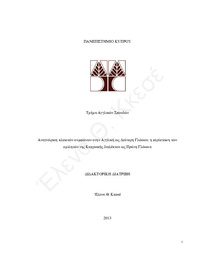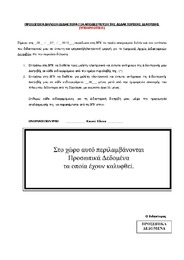| dc.contributor.advisor | Παναγιωτίδης, Ευθύβουλος (Φοίβος) | el |
| dc.contributor.author | Κκεσέ, Έλενα Θ. | el |
| dc.coverage.spatial | Κύπρος | el |
| dc.creator | Κκεσέ, Έλενα Θ. | el |
| dc.date.accessioned | 2017-08-28T11:08:44Z | |
| dc.date.available | 2017-08-28T11:08:44Z | |
| dc.date.issued | 2013-07 | |
| dc.date.submitted | 2013-07-18 | |
| dc.identifier.uri | https://gnosis.library.ucy.ac.cy/handle/7/39594 | en |
| dc.description | Περιέχει βιβλιογραφία (σ. 168-205). | el |
| dc.description | Αριθμός δεδηλωμένων πηγών στη βιβλιογραφία: 507 | el |
| dc.description | Διατριβή (Διδακτορική) -- Πανεπιστήμιο Κύπρου, Σχολή Ανθρωπιστικών Επιστημών, Τμήμα Αγγλικών Σπουδών, 2013. | el |
| dc.description | Η βιβλιοθήκη διαθέτει αντίτυπο της διατριβής σε έντυπη μορφή. | el |
| dc.description.abstract | Στην παρούσα διατριβή εξετάζονται οι δυσκολίες που αντιμετωπίζουν οι ενήλικες ομιλητές της Κυπριακής διαλέκτου με τα κλειστά σύμφωνα στην Αγγλική ως Δεύτερη Γλώσσα. Συγκεκριμένα, παρουσιάζει τα αποτελέσματα δυο μέσων συλλογής δεδομένων που εξετάζουν την απόκτηση των διαφορών μεταξύ άηχων και ηχηρών κλειστών από φοιτητές κολλεγίου, ομιλητών της Κυπριακής διαλέκτου. Οι διαφορές μεταξύ άηχων και ηχηρών κλειστών που εξετάζονται περιλαμβάνουν τα διχειλικά κλειστά [p], [b] (όπως στις Αγγλικές λέξεις pacing αντί basing), τα οδοντικά κλειστά [t], [d] (όπως στις Αγγλικές λέξεις towering αντί dowering) και τα υπερωικά κλειστά [k], [g] (όπως στις Αγγλικές λέξεις crammer αντί grammar). Τα μέσα συλλογής δεδομένων εστιάζουν στους διαφορετικούς παράγοντες που επηρεάζουν την αντίληψη των κλειστών και τους τύπους λαθών που περιλαμβάνουν κλειστά σύμφωνα. Σε σχέση με το πρώτο ζήτημα, η φωνητική αντίληψη των κλειστών φαίνεται να είναι καλύτερη στα άηχα σύμφωνα σε σύγκριση με τα ηχηρά αντίστοιχα τους, παρέχοντας με αυτό τον τρόπο αποδεικτικά στοιχεία για την σημασία του παράγοντα που αφορά τις διαφορές μεταξύ άηχων και ηχηρών. Παράγοντες όπως η θέση της λέξης (word position), η θέση της συλλαβής (syllable position), και ο τόπος της άρθρωσης (place of articulation) φαίνονται επίσης να επηρεάζουν την αντίληψη για τα κλειστά αλλά αποδεικνύονται να είναι δευτερεύουσας σημασίας. Σε σχέση με το δεύτερο ζήτημα, τα αποτελέσματα κατέδειξαν προς την ίδια κατεύθυνση αφού φαίνεται ότι οι χρήστες της Δεύτερης Γλώσσας απέδωσαν αρκετά καλύτερα στα άηχα κλειστά. Φάνηκε επίσης ότι ήταν σε θέση ν’ αντιληφθούν τα ηχηρά κλειστά αλλά ότι αντιμετώπιζαν τέτοια περιστατικά σαν ακολουθία /έρρινου+ηχηρού κλειστού/ (έρρινα κλειστά). Επομένως, τα γενικά αποτελέσματα υποστηρίζουν τα ευρήματα προηγούμενων μελετών που πρότειναν ότι τα ηχηρά κλειστά γίνονται αντιληπτά διαφορετικά στη Κυπριακή διάλεκτο ενώ οι δυσκολίες των ομιλητών (της Κυπριακής διαλέκτου) στην Δεύτερη Γλώσσα με τα κλειστά φαίνεται να οφείλονται σε διαφορες VOT (Voice Onset Time) μεταξύ της Πρώτης και Δεύτερης Γλώσσας. Η ικανότητα των ομιλητών της Κυπριακής διαλέκτου να διακρίνουν τα άηχα και τα ηχηρά κλειστά της Αγγλικής ως Δεύτερη Γλώσσα επηρεάζεται από τα οριζόμενα χαρακτηριστικά VOT της συγκεκριμένης Πρώτης Γλώσσας με αποτέλεσμα να έχουν την ίδια κατηγορία για άηχα και ηχηρά κλειστά ενώ συμπλέγματα συμφώνων που αποτελούνται από /έρρινο+ηχηρό κλειστό/ ν’ αντιμετωπίζονται ως έρρινα κλειστά όπως συμβαίνει στην Πρώτη Γλώσσα. Η συζήτηση των αποτελεσμάτων της μελέτης σε σχέση με τις προσεγγίσεις της φωνολογίας της δεύτερης γλώσσας (second language phonology) και της αντίληψης της ομιλίας (speech perception) φαίνεται να συμφωνεί περισσότερο με την αντίληψη της ομιλίας προτείνοντας ότι οι δυσκολίες των ομιλητών της Κυπριακής διαλέκτου με τα κλειστά σύμφωνα στην Αγγλική ως Δεύτερη Γλώσσα οφείλονται σε διαφορές VOT (εκφράζοντας τα οριζόμενα χαρακτηριστικά VOT της συγκεκριμένης γλώσσας). | el |
| dc.description.abstract | This dissertation investigates the difficulties adult second language (L2) users of English encounter with plosive consonants in the L2. It presents the results of two tasks examining the acquisition of plosive voicing contrasts by college students with Cypriot Greek (CG) backgrounds. The plosive voicing contrasts examined involve the bilabial plosives [p], [b] (as in English pacing vs. basing), the alveolar plosives [t], [d] (as in towering vs. dowering) and the velar plosives [k], [g] (as in crammer vs. grammar). The tasks focus on the different factors affecting plosive identification and the types of errors involving plosives. With respect to the first issue, the phonetic perception of plosives turns out to be better in voiceless consonants compared to their voiced counterparts, thus providing evidence for the importance of the voicing contrast factor. Factors such as word position, syllable position, and place of articulation seem to also affect plosive identification but they were found to be of secondary importance. With respect to the second issue, the results point to the same direction since it appears that L2 users performed significantly better in voiceless plosives. It is also indicated that they were able to perceive voiced plosives but they treated such instances as a /nasal+voiced plosive/ sequence (prenasalised plosives). Therefore, the overall results support the findings of previous studies suggesting that voiced plosives are realised differently in CG while the difficulties of the L2 CG users with plosives seem to be attributed to VOT differences between the L1 and the L2. The ability of CG users to differentiate between voiceless and voiced plosives in L2 English is affected by the language-specific VOT settings of the L1 resulting in having the same category for voiceless and voiced plosives while /nasal+voiced plosive/ clusters are treated as prenasalised plosives just like in their L1. These obtained results are discussed in relation to the approaches of second language phonology and speech perception and seem to agree mostly with the speech perception approach suggesting that the CG users’ difficulties with L2 plosives in English are due to VOT differences (reflecting the language-specific VOT settings of the CG). | en |
| dc.format.extent | xix, 276 p. : ill. ; 30 cm. | en |
| dc.language.iso | gre | en |
| dc.publisher | Πανεπιστήμιο Κύπρου, Σχολή Ανθρωπιστικών Επιστημών / University of Cyprus, Faculty of Humanities | |
| dc.rights | info:eu-repo/semantics/openAccess | en |
| dc.rights | Open Access | en |
| dc.subject.lcsh | Second language acquisition | en |
| dc.subject.lcsh | English language Accents and accentuation | en |
| dc.subject.lcsh | English language Phonology | en |
| dc.subject.lcsh | English language Study and teaching Greek speakers | en |
| dc.subject.lcsh | English language Pronunciation by foreign speakers | en |
| dc.subject.lcsh | English language Cyprus Pronunciation | en |
| dc.title | Αναγνώριση κλειστών συμφώνων στην Αγγλική ως δεύτερη γλώσσα : η περίπτωση των ομιλητών της κυπριακής διαλέκτου ως πρώτη γλώσσα | el |
| dc.title.alternative | Identifying plosives in L2 English: the case of L1 Cypriot Greek speakers | en |
| dc.type | info:eu-repo/semantics/doctoralThesis | en |
| dc.contributor.committeemember | Παναγιωτίδης, Ευθύβουλος (Φοίβος) | el |
| dc.contributor.committeemember | Πετεινού, Κάκια | el |
| dc.contributor.committeemember | Παπαπαύλου, Ανδρέας Ν. | el |
| dc.contributor.committeemember | Τσαγγαρή, Ντίνα | el |
| dc.contributor.committeemember | Panagiotidis, Efthyvoulos (Phoevos) | en |
| dc.contributor.committeemember | Petinou, Kakia | en |
| dc.contributor.committeemember | Papavlou, Andreas N. | en |
| dc.contributor.committeemember | Tsagari, Dina | en |
| dc.contributor.committeemember | Lust, Barbara | en |
| dc.contributor.department | Τμήμα Αγγλικών Σπουδών / Department of English Studies | |
| dc.subject.uncontrolledterm | ΚΛΕΙΣΤΑ ΣΥΜΦΩΝΑ | el |
| dc.subject.uncontrolledterm | ΑΗΧΑ/ΗΧΗΡΑ ΚΛΕΙΣΤΑ | el |
| dc.subject.uncontrolledterm | ΑΓΓΛΙΚΗ ΓΛΩΣΣΑ | el |
| dc.subject.uncontrolledterm | ΚΥΠΡΙΑΚΗ ΔΙΑΛΕΚΤΟΣ | el |
| dc.subject.uncontrolledterm | ΠΡΟΣΕΓΓΙΣΗ ΤΗΣ ΑΝΤΙΛΗΨΗΣ ΤΗΣ ΟΜΙΛΙΑΣ | el |
| dc.subject.uncontrolledterm | ΕΡΡΙΝΑ ΚΛΕΙΣΤΑ | el |
| dc.subject.uncontrolledterm | ΑΠΟΚΤΗΣΗ ΔΕΥΤΕΡΗΣ ΓΛΩΣΣΑΣ | el |
| dc.subject.uncontrolledterm | PLOSIVE CONSONANTS | en |
| dc.subject.uncontrolledterm | VOICELESS/VOICED PLOSIVES | en |
| dc.subject.uncontrolledterm | ENGLISH LANGUAGE | en |
| dc.subject.uncontrolledterm | CYPRIOT GREEK DIALECT | en |
| dc.subject.uncontrolledterm | SPEECH PERCEPTION APPROACH | en |
| dc.subject.uncontrolledterm | PRENASALISED PLOSIVES | en |
| dc.subject.uncontrolledterm | VOT (VOICE ONSET TIME) | en |
| dc.subject.uncontrolledterm | SECOND LANGUAGE ACQUISITION | en |
| dc.identifier.lc | PE1139.K44 2013 | en |
| dc.author.faculty | Σχολή Ανθρωπιστικών Επιστημών / Faculty of Humanities | |
| dc.author.department | Τμήμα Αγγλικών Σπουδών / Department of English Studies | |
| dc.type.uhtype | Doctoral Thesis | en |
| dc.rights.embargodate | 2016-07-03 | |
| dc.contributor.orcid | Παναγιωτίδης, Ευθύβουλος (Φοίβος) [0000-0002-2318-6472] | |


